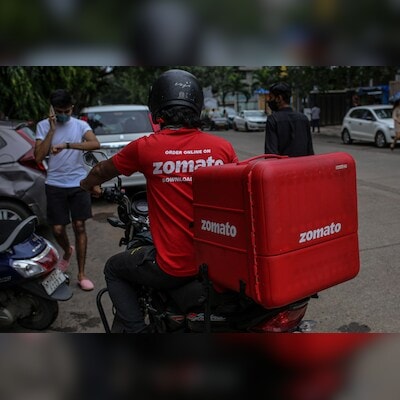Ordering food from Zomato to get costlier as the company hikes platform fee
The nearly 260% surge in Zomato since last April has made it difficult for consensus to keep up, but expectations continue to rise. Photographer: Dhiraj Singh/Bloomberg
Previously, on January 1, Zomato increased its platform fee for users from Rs 3 to Rs 4.
Reportedly, Zomato processes between 2 and 2.2 million orders daily, suggesting that a Rs 1 increase across this large order volume could significantly boost the company’s earnings over a quarter.
Zomato applies the platform fee in addition to a delivery charge, although this is waived for customers enrolled in its Zomato Gold loyalty program, who receive benefits like discounts and free delivery after an upfront payment. The platform fee is also applicable to Zomato Gold members.
In comparison, Zomato’s chief competitor, Swiggy, charges a platform fee of Rs 5 on food delivery orders.
Zomato introduced this fee first in August 2023 at Rs 2 per order, later raising it to Rs 3 in most major markets in October. Zomato’s quick-commerce platform, Blinkit, also imposes a handling charge of Rs 2 on every order.
Industry insiders had previously suggested that the January increase in platform fees could help Zomato offset a substantial tax demand of over Rs 402 crore from goods and services tax authorities.
Zomato intercity service ‘Legends’ halted
Zomato has also paused its intercity delivery service, Legends, and is aiming to overhaul its model. The latest version of Legends failed to attract significant consumer interest and encountered legal challenges, an Economic Times report claimed, citing sources.
Initially launched in 2022, Legends initially delivered food from select restaurants in specific cities to designated cities. However, Zomato modified the model last year to deliver pre-stocked items from other cities within a shorter delivery time frame.
Just three months after the intercity delivery service launched, Siddharth Jhawar, Zomato’s head of intercity delivery, resigned from the company.
For the October-December period, the food delivery giant reported its third consecutive quarterly profit of Rs 138 crore, compared to a Rs 36 crore profit in the previous quarter and a Rs 347 crore loss in the same period of 2022. Consolidated operating revenue for the December quarter increased by 69 per cent year-on-year to Rs 3,288 crore.
Troubles with Intercity ‘Legends’
Earlier this year, a resident of New Delhi filed a lawsuit against Zomato in a district court, contesting the company’s claim of delivering food from renowned restaurants in other cities while actually providing pre-stocked items from nearby warehouses. The case is ongoing.
Zomato receives RBI nod for online payments
In January, Zomato received authorization from the Reserve Bank of India (RBI) to operate as an online payment aggregator, as disclosed in a regulatory filing. This accreditation enables the company to facilitate online transactions through its platform.
Last year, the Gurugram-based food delivery giant announced a collaboration with ICICI Bank to launch its payments business, Zomato Pay. Since then, the company has pursued acquiring a payments licence to reduce merchant charges associated with third-party apps like Google Pay, Paytm, and PhonePe.
With this move, Zomato had joined the ranks of companies like Razorpay, Cashfree Payments, and EnKash, all of whom have also been granted payment aggregator licences.
First Published: Apr 22 2024 | 9:52 AM IST
